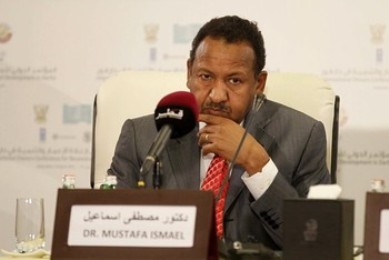Sudan’s ruling party backpedals on stance in Berlin declaration
March 18, 2015 (KHARTOUM) – The Sudanese government denied that it welcomed the Berlin Declaration signed by political and armed opposition pointing it welcomed efforts made by Germany to convince opposition forces to join the national dialogue.

On 9 March, the NCP formally welcomed the Berlin declaration.
The pro-government Sudan Media Centre (SMC) website quoted on Tuesday the head of the NCP political sector, Mustafa Osman Ismail, as saying “we must differentiate between the statement issued by the German foreign ministry about the outcome of efforts it made to arrive at solutions to Sudan’s problems and the Berlin declaration”.
Sudanese president Omer Hassan al-Bashir on Saturday described the Berlin declaration as a “failure” considering it “as if it had not taken place”.
Bashir added the German government made efforts to support Sudan and help resolve its problems, pointing that the Berlin meeting was organised to achieve three goals, including recognition of the legitimacy of the government by the opposition, participation of the opposition in the national dialogue and not to postpone the elections.
Ismail said the statement of the German foreign ministry has not included preconditions such as those stated by the opposition, adding that consultations between his government, the African Union mediation and the German government evolve around encouraging opposition to join the government-led national dialogue.
The national dialogue was launched by the Sudanese president in January 2014 where he urged opposition parties and rebels alike to join the dialogue table to discuss all the issues related to peace and constitutional reforms.
But the initiative faced serious setbacks as the government refusal to postpone elections and create a suitable atmosphere for democratic debate led the opposition alliance left parties and rebel groups distance themselves from the process. Later, the National Umma Party (NUP) led by al-Sadiq al-Mahdi withdrew from the process in protest of al-Mahdi’s arrest last May.
by the end of last year, several political parties including the Reform Now Movement (RNM) led by Ghazi Salah al-Din and the Just Peace Forum (JPF) led by al-Tayeb Mustafa and the Alliance of the Peoples’ Working Forces (APWF) suspended their participation in the national dialogue until the requirements of a conducive environment are met.
The NCP political secretary said they are not concerned with the conditions stated by the opposition in Berlin declaration, stressing that the accord is similar to several previous declarations signed by the opposition forces.
He further underscored Sudan’s adherence to the African mediation, saying they will not agree to any attempt to replace it or to change the venue of talks with the political and armed opposition.
The Berlin declaration signatories accepted to meet the NCP-led government in a preparatory meeting to be organised by the African Union mediators as designed in a roadmap endorsed by the African Union Peace and Security Council.
However, the opposition and rebel forces underscored the need to implement the confidence-building measures as described in the African roadmap before participating in national dialogue.
The text called for stopping the war and allowing the unrestricted flow of aid and unleashing public freedoms and release of political detainees.
(ST)
